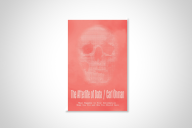You have /5 articles left.
Sign up for a free account or log in.
Late last week the Association of American University Presses held its annual meeting in New Orleans, or in what was left of it. Attendance is usually around 700 when the conference is held in an East Coast city. This time, just over 500 people attended, representing more than 80 presses -- a normal turnout, in other words, justifying the organizers’ difficult decision last fall not to change the location.
Inside the Sheraton Hotel itself, each day was a normal visit to Conference Land -- that well-appointed and smoothly functioning world where academic or business people (or both, in this case) can focus on the issues that bring them together. Stepping just outside, you were in the French Quarter. It wasn’t hit especially hard by last year’s catastrophic weather event. But there were empty buildings and boarded-up windows; the tourist-trap souvenir outlets offered a range of Katrina- and FEMA-themed apparel, with “Fixed Everything My Ass” being perhaps the most genteel message on sale.
The streets were not empty, but the place felt devitalized, even so. Only when you went outside the Quarter did the full extent of the remaining damage to the city really begin to sink in. On Thursday morning -- as the first wave of conference goers began to register -- a bus chartered by the association took a couple dozen of us around for a tour led by Michael Mitzell-Nelson and Greta Gladney (a professor and a graduate student, respectively, at the University of New Orleans). If the Quarter was bruised, the Ninth Ward was mangled.
It was overwhelming -– too much to take in. More imagery and testimony is available from the Hurricane Digital Memory Bank, a project sponsored by the University of New Orleans and the Center for History and New Media at George Mason University.
So you came back a little unsettled at the prospect of discussing business as usual. Then again, the prevailing idea at this year’s AAUP was that business has changed, and that university presses are rushing to catch up. The announced theme of the year’s program was “Transformational Publishing” -- with that titular buzzword covering the myriad ways that digital technologies affect the way we read now.
It was a far cry from the dismal slogan making the rounds at the AAUP meeting three years ago: “Flat is the new ‘up.’ ” In other words: If sales haven’t actually gone down, you are doing as well as can be expected. The cumulative effect of increasing production costs, budget cuts, and reduced library sales was a crisis in scholarly publishing. The lists of new titles got shorter, and staffs grew leaner; in a few cases, presses closed up shop.
I asked Peter Givler, the association’s executive director, if anyone was still using the old catch phrase. “Right now it looks like up is the new up,” he said. “It’s been a modest improvement, and we’re hearing from our members that there’s been a large return of books this spring. But it’s not like the slump that started in 2001.”
Cautious optimism, then, not irrational exuberance. While the word “digital” and its variants appeared in the title of many a session, it is clear that new media can be both a blessing and a curse. On the one hand, the association has been able to increase the visibility of its members’ output through the Books for Understanding Web site, which offers a convenient and reliable guide to academic titles on topics of public interest. (See, for example, this page on New Orleans.) At the same time, the market for university-press titles used in courses has been undercut by the ready availability of secondhand books online.
And then there’s Google Book Search. The AAUP has not joined the Authors Guild’s class action suit against Google for digitizing copyrighted materials. But university presses belong to the class of those with an interest in the case -- so the organization has incurred legal expenses while monitoring developments on behalf of its members. One got the definite impression that the other shoe may yet drop in this matter. During the business meeting, Givler indicated that the association would be undertaking a major action soon that would place additional demands on the organization's resources. I tried to find out more, but evidently its Board of Directors is playing its cards close to the vest for now.
With new obligations to meet, the board requested a 4 percent increase in membership dues. This was approved during the business meeting on Thursday. (Three members voting by proxy were opposed to it, but no criticism was expressed from the floor during the meeting itself.)
Proposals for longer-term changes in the organization’s structure and mission were codified in its new Strategic Plan (the first updating of the document since 1999). A working draft was distributed for discussion at the conference; the final version will be approved by the board in October.
This document -- not now available online -- conveys a very clear sense of the opportunities now open before university presses. (For “opportunities,” read also “stresses and strains.”)
It’s not just that technological developments are shaping how books get printed, publicized, and sold -- or even how we do research. A variety of new forms of scholarly publishing are emerging -- some of which make an end run around traditional university presses. “Societies, libraries, and other scholarly groups are now more likely to undertake publishing ventures themselves,” the proposal notes, “although they often lack the editing, marketing, and business skills found in abundance in university presses.”
Full membership in AAUP is restricted to presses that meet certain criteria, including “a faculty board that certifies the scholarly quality of the publications; a minimum number of publications per year; a minimum number of university-employed staff including a full-time director; and a statement of support from the parent organization.” But an ever larger number of learned publications – print, digital, or whatever – are issued by academic or professional enterprises that don’t follow this well-established model.
Indeed, if you hang around younger scholars long enough, it is a matter of time before someone begins pointing out that the old model might be jettisoned entirely. Why spend two years waiting for your monograph to appear from Miskatonic University Press when it might be made available in a fraction of that time through some combination of new media, peer review, and print-on-demand? No one broached such utopian ideas at AAUP (where, of course, they would be viewed as dystopian). But they certainly do get mooted. Sometimes synergy is not your friend.
The organization’s new strategic plan calls for reaching out to “nonprofit scholarly publishers and organizations whose interests and goals are compatible with AAUP” -- in part, by revising the membership categories and increasing the range of benefits. New members would be recruited through an introductory membership offer “open to small nonprofit publishers.”
These changes, if approved, will go into effect in July 2007. Apart from increasing the size of the association, they would bring in revenue -- thereby funding publicity, outreach, and professional-education programs. (One of the projects listed as “contemplated” is creation of “a ‘basic book camp’ to orient new and junior staff to working at a scholarly press.” I do like the sound of that.)
For the longer term, the intent is clearly to shore up the role of the university press’s established standards in an environment that seems increasingly prone to blowing them away.
“University presses,” the AAUP plan stresses, “are well positioned to be among the leaders in the academic community who help universities through a confusing and expensive new world. They can enhance the ability of scholars to research, add value to, and share their work with the broadest possible audiences, and they can help to develop intellectual property policies and behaviors sensible to all.”
Of course, not every discussion at the meeting was geared to the huge challenges of the not-too-distant future. Late Friday afternoon, I went to an interesting session called “Smoke, Mirrors, and Duct Tape: Nurturing a Small Press at a Major University.” It was a chance to discuss the problems that go with being a retro-style academic imprint at an institution where, say, people assume you are the campus print shop. (Or, worse, that you have some moral obligation to publish the memoirs of faculty emeritus.)
It was the rare case of an hour I spent in New Orleans without hearing any variation on the word “digital.” After getting home, I contacted one of the participants, Joseph Parsons, an acquisitions editor for the University of Iowa Press, to ask if that was just an oversight. Had academic digitality hit Iowa?
"We routinely deal with electronic files, of course," he responded, "but the books we produce have been of the old-fashioned paper and ink variety.... When we contract with authors, we typically include digital rights as part of the standard agreement, but we haven't published anything suitable for an electronic book reader."
He went on to mention, however, that print-on-demand was a ubiquitous and very reasonable option for small press runs. It was surprising that he made the point -- for a couple of reasons. POD now seems like an almost antique form of "new media," in the age of Web 2.0. I don't recall hearing it discussed in New Orleans, for example, except in passing. At the same time, it clearly fit into the plans of an old-school university press with a catalog emphasizing literature and some of the the less trend-obsessed quadrants of the humanities. It seemed like a reasonable compromise between sticking with what you already know and making a leap into the digital divide.
Anyway, I'm just glad to think there will continue to be books, at least for a while. As a matter of fact, while in New Orleans, I even bought a few. They were second-hand, admittedly, but it seemed as if the shop owner needed the business more than any of the university presses did.








